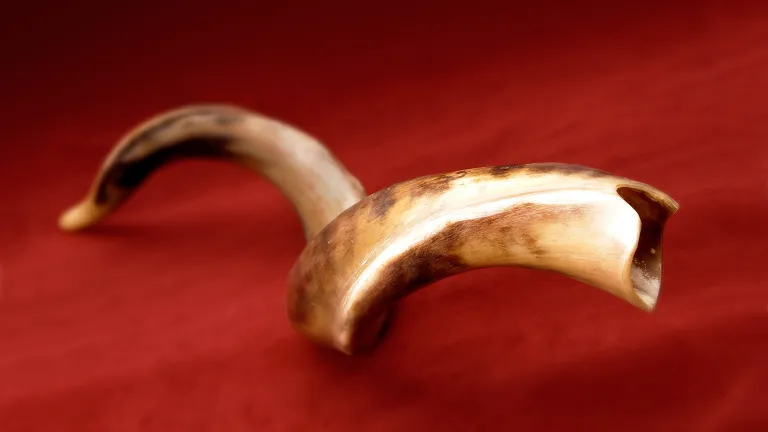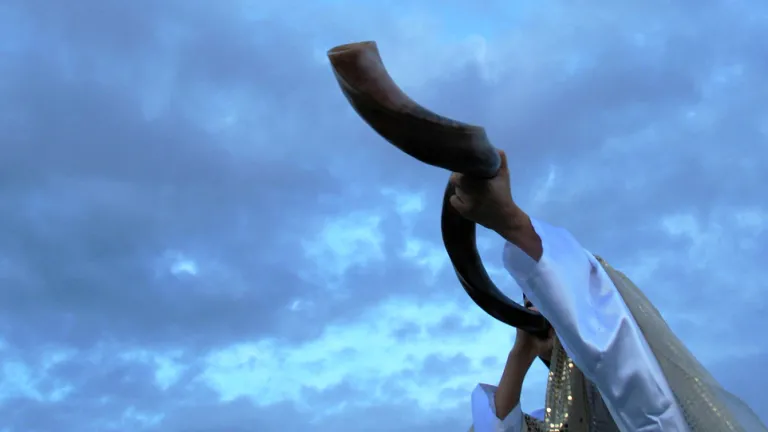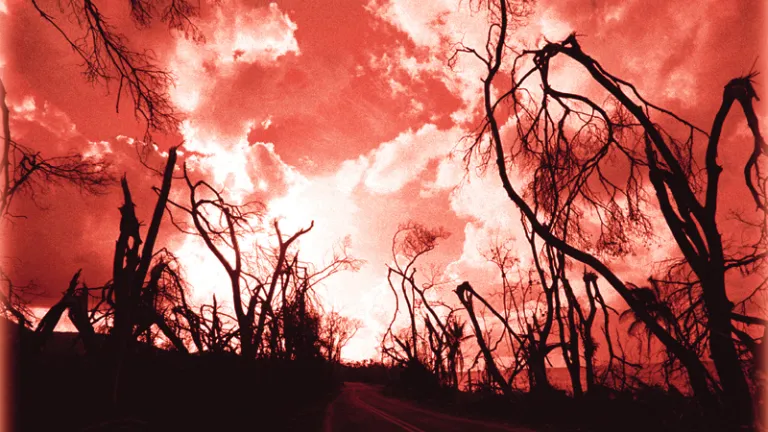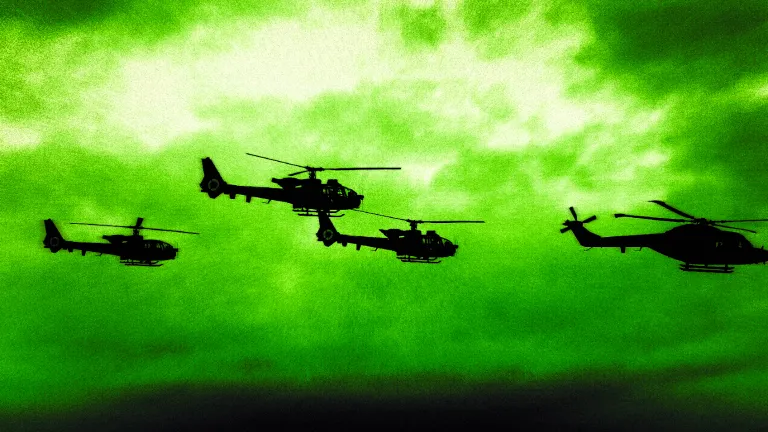The Exciting Feast of Trumpets

The Feast of Trumpets, one of the Holy Days of the Bible, pictures future times of both sadness and gladness—essential steps leading to the establishment of the Kingdom of God on earth!
Bugle calls have appealed to me since watching a lot of cowboy movies as a kid. The plots were often similar: Everyone on a wagon train was about to be slaughtered by Indians. The tension was terrible. Then, at last, the exciting climax of the movie—the rising sound of the bugle call signaling "Charge"! The U.S. Cavalry came galloping over the ridge just in time to save the wagon train!
The use of trumpets and bugles to send signals has a long history. In Old Testament times, it's fascinating to see how ancient Israel used trumpet calls for numerous orders and announcements.
Few people realize that one of the seven annual festivals commanded by God is called the Feast of Trumpets. But why? Notice God's command:
"And in the seventh month [corresponding to our September/October], on the first day of the month, you shall have a holy convocation [a commanded worship assembly]. You shall do no customary work. For you it is a day of blowing the trumpets" (Numbers 29:1; see also Leviticus 23:24; emphasis added throughout).
In the original Hebrew here, no trumpets are actually mentioned. Rather, the phrase "blowing of trumpets" has been translated from the single word teruah, which signifies the making of a loud noise or clamor. It is sometimes translated "shout," as made by human voices (e.g., Joshua 6:10). It's also rendered "alarm" in association with the sound of the shofar or ram's horn (Jeremiah 4:19).
A form of the word also refers to sounding an alarm with metal trumpets or hatsotserot (Numbers 10:9—silver trumpets in this case). In Psalm 98, the word is rendered "shout joyfully," and applies to loud singing as well as blowing metal trumpets and the ram's horn in celebration (Psalm 98:4-6).
Numbers 10:1-10 relates the uses of the two silver trumpets of the tabernacle, including calls to assemblies, announcing special occasions and events such as holy days and sacrifices, and for alarms of war, as mentioned. Interestingly, the shofar was used for some of the same purposes. One distinction, however, was that only the priests were authorized to blow the silver trumpets.
Thus, making a loud noise, particularly through the ram's horn and other trumpets, can be celebratory as well as a dire warning—like a tornado siren. Both aspects are part of the important meaning of this Holy Day.
A mighty trumpet announces the second coming of Christ
The Feast of Trumpets holds special excitement because it initiates the autumn festival season of four festivals. As with all the annual feasts, we need the New Testament to fully understand the meaning and symbolism.
Most interesting is what the Bible reveals about trumpet calls in connection with future prophesied events—events pointed to by the Feast of Trumpets!
Scripture tells us that an earth-shaking trumpet call will announce the most important and exciting event that will ever happen to humanity—the second coming of Jesus Christ! This will be the great climax and turning point of all history!
Note how Jesus described His future return: "Then the sign of the Son of Man will appear in heaven, and then all the tribes of the earth will mourn, and they will see the Son of Man coming on the clouds of heaven with power and great glory. And He will send His angels with a great sound of a trumpet, and they will gather together His elect from the four winds, from one end of heaven to the other" (Matthew 24:30-31).
Another great event: the resurrection of the saints
Another major event that happens at Christ's return is the resurrection of God's faithful servants, the saints.
Both the Old Testament and the New Testament frequently use the word "saints" to refer to the faithful followers of God. In the New Testament, they are also called the "elect," those selected or chosen (as in Matthew 24:31).
The apostle Paul wrote: "For the Lord Himself will descend from heaven with a shout, with the voice of an archangel, and with the trumpet of God. And the dead in Christ [the saints who have died] will rise first. Then we [saints] who are alive and remain shall be caught up together with them in the clouds to meet the Lord in the air. And thus we shall always be with the Lord" (1 Thessalonians 4:16-17).
The resurrection of the saints to glorified spirit life to "reign with" Christ is called in Scripture "the first resurrection." A second resurrection will follow 1,000 years later for "the rest of the dead" (Revelation 20:5-6).
The 15th chapter of 1 Corinthians is largely about the resurrection of the saints— see particularly 1 Corinthians 15:12-13 and 1 Corinthians 15:20-23. Paul then goes on to describe this resurrection in 1 Corinthians 15:42-44: "So also is the resurrection of the dead. The body is sown in corruption, it is raised in incorruption. It is sown in dishonor, it is raised in glory. It is sown in weakness, it is raised in power. It is sown a natural body, it is raised a spiritual body."
Then Paul states when this resurrection will occur: "Behold, I tell you a mystery: We shall not all sleep [meaning not all in this resurrection will be dead in the grave when Christ returns], but we shall all be changed—in a moment, in the twinkling of an eye, at the last trumpet. For the trumpet will sound, and the dead will be raised incorruptible, and we shall be changed. For this corruptible must put on incorruption, and this mortal must put on immortality" (1 Corinthians 15:51-53).
Is this a "secret rapture"? Absolutely not. The popular idea of a "rapture" is a little bit of truth mixed with lots of errors. Christ will return "with a shout, with the voice of an archangel, and with the trumpet of God" (1 Thessalonians 4:16). It will be anything but secret!
While many of the saints will be protected during the end-time Great Tribulation (see Revelation 12:12-17), this will be on earth, not in heaven. In fact, the reward of the saints is not that of going to heaven at death, as so many think. It will be eternal life in the Kingdom of God, which Christ will establish on the earth when He returns (Matthew 5:5; Matthew 6:10; Revelation 5:10).
Those who are a part of the first resurrection will rule with Jesus Christ here on earth. Eternal life in the Kingdom of God will then be offered to all those who inhabit the earth. (To learn more, read our free Bible study aids Heaven and Hell: What Does the Bible Really Teach? and You Can Understand Bible Prophecy.)
A scroll sealed with seven seals
Many people have a very limited perspective of Jesus Christ. They think only of His first coming as the suffering Savior and as the Lamb of God. But He, along with the Father, is a God of justice and judgment as well as a God of mercy and forgiveness. When Jesus comes the second time, it will be as "the Lion of the tribe of Judah" to punish those who are in rebellion against God (Revelation 5:5). That will be essential to prepare the way for true peace on earth.
The end-time sequence of events is pictured as Christ unrolling a scroll by breaking open its seven seals one by one (Revelation 5). The sequence of the seals is the same sequence of events Jesus described in His prophecy about His return recorded in Matthew 24, Mark 13 and Luke 21. These are crises that will be growing in frequency and intensity leading up to that time.
The opening of the first four seals unveils what are commonly referred to as the "four horsemen of the Apocalypse," representing false religion, war, famine and death by pestilence and various disasters (see Revelation 6:1-8). The fifth seal represents the persecution of God's people and the Great Tribulation, when God will use gentile nations to punish the nations that are the modern descendants of ancient Israel (Revelation 6:9-11; Matthew 24:21; Jeremiah 30:7).
Then "immediately after the tribulation" will be heavenly signs with the opening of the sixth seal (Matthew 24:29-30; Revelation 6:12-16).
The seventh seal: the Day of the Lord
The heavenly signs of the sixth seal announce the Day of the Lord, with fearful people crying out: "For the great day of His wrath has come, and who is able to stand?" (Revelation 6:17). Likewise, the prophet Joel tells us that the heavenly signs will happen just "before the coming of the great and awesome day of the Lord" (Joel 2:31). So the period of the seventh seal that follows in Revelation is the Day of the Lord. (Except for a few inset chapters, the book of Revelation is organized quite sequentially.)
The Day of the Lord is the time of God's major intervention on the earth. This age is Satan's "day," when "the whole world lies under the sway of the wicked one" (1 John 5:19). The Day of the Lord begins when Christ begins to take back control and mete out calamitous judgment on the rebellious nations that defy God.
Joel says, "The day of the Lord is great and very terrible; who can endure it?" (Joel 2:11; see also Joel 1:15; Joel 2:1; Joel 3:14). The Day of the Lord is also called, as we saw in Revelation 6:17, "the great day of His wrath." Numerous other prophecies describe the fierce wrath of God against the forces of evil during the Day of the Lord.
The opening of the "seventh seal," which is the Day of the Lord, reveals "seven angels" with "seven trumpets" (Revelation 8:1-2). Each trumpet blast announces terrifying calamities that will afflict rebellious mankind. The blowing of these trumpets apparently takes place over the course of a year, since Isaiah 34:8 refers to this time as "the Day of the Lord's vengeance, the year of recompense for the cause of Zion." And one trumpet plague takes five months, as we'll see in a moment.
This year comes at the end of the time of terrible tribulation and concludes with the return of Jesus Christ and the resurrection. Given the seven warning trumpets over this period, it would seem that the Feast of Trumpets pictures all of it, not just Christ's return and the resurrection at the end— though these events at the end following the final trumpet are certainly the high point.
Be assured that while Jesus Christ is sending plagues and other punishments on the earth, He will be protecting His faithful followers (although He will allow some to be martyred). To them He promises, "Because you have kept My command to persevere, I also will keep you from the hour of trial which shall come upon the whole world, to test those who dwell on the earth" (Revelation 3:10; see also Revelation 7:3).
The blowing of the seven trumpets
After each of the first three trumpets, devastating destruction befalls the earth (Revelation 8:1-11). The fourth trumpet announces a time of great darkness (Revelation 8:12).
When the fifth angel sounds, a mighty army suddenly comes on the scene with great power, including power that will be used against its enemies "to torment them for five months" (Revelation 9:1-12).
When the sixth angel sounds, a giant army of 200 million comes from the east, resulting in the deaths of a third of mankind (Revelation 9:13-21). One would think that all the survivors would then have enough sense and fear of God to repent of their sins, but not so—"they did not repent" (Revelation 9:20-21).
When the seventh angel sounds, he is announcing events both wonderful and terrifying. The wonderful events are the coronation of Jesus Christ as King of Kings, His return to rule all nations and the resurrection of the saints—"at the last trumpet" (1 Corinthians 15:52). And the terrifying events are a series of seven last plagues, as we'll see.
Revelation 11:15-18 proclaims: "The seventh angel sounded his trumpet, and there were loud voices in heaven, which said: ‘The kingdom of the world has become the kingdom of our Lord and of his Messiah [or Christ], and he will reign for ever and ever.'
"And the twenty-four elders, who were seated on their thrones before God, fell on their faces and worshiped God, saying: ‘We give thanks to you, Lord God Almighty, the One who is and who was, because you have taken your great power and have begun to reign.
"‘The nations were angry, and your wrath has come. The time has come for judging the dead, and for rewarding your servants the prophets and your people who revere your name, both small and great—and for destroying those who destroy the earth" (NIV).
The warning in the seventh trumpet
Note what follows in Revelation 15:1: "Then I saw another sign in heaven, great and marvelous: seven angels having the seven last plagues, for in them the wrath of God is complete."
Revelation 16 goes on to describe the seven last plagues. The first is a terrible affliction on people, the second is on the sea and its creatures, and the third is on all the rivers and springs of water. The fourth plague is on the sun, which creates scorching heat. The fifth plague is darkness and extremely painful sores.
Again, in spite of the terrible pain and suffering, the prophecy recounts in advance that these people "did not repent of their deeds" (Revelation 16:9-11). Yet even these stubborn people will have an opportunity for salvation. After dying and being resurrected a thousand years later, they will at last be receptive to Christ's teachings.
The sixth angel announces a vast army coming from the east led by Satan and his demons. They "go out to the kings of the earth and of the whole world, to gather them to the battle of that great day of God Almighty" (Revelation 16:12-14).
"And they gathered them together to the place called in Hebrew, Armageddon" (Revelation 16:16). Armageddon means Mount or Hill of Megiddo. This place northwest of Jerusalem has been a gathering place for armies numerous times in the past. Other scriptures show that the actual "battle of that great day of God Almighty" will be in and around Jerusalem.
The seventh angel announces incredible cataclysms! "And there were noises and thunderings and lightnings; and there was a great earthquake, such a mighty and great earthquake as had not occurred since men were on the earth . . . And great hail from heaven fell upon men, each hailstone about the weight of a talent. Men blasphemed God because of the plague of the hail, since that plague was exceedingly great" (Revelation 16:18-21).
Then comes the Commander and His heavenly cavalry for the final battle!
The triumphant return of Jesus Christ
Revelation 17 describes a powerful and evil worldwide system called "Babylon the great." Its armies and the armies of its enemies are about to fight each other when they instead turn to fight against the returning Jesus Christ. Revelation 17:14 says, "These will make war with the Lamb, and the Lamb will overcome them, for He is Lord of lords and King of kings; and those who are with Him are called, chosen, and faithful." Revelation 18 goes on to describe the fall of this system called Babylon.
Revelation 19 begins with scenes in heaven. Then Revelation 19:7-9 refer to "the marriage of the Lamb" to "His wife," the Church, and "the marriage supper."
Then we read of the awesome arrival and conquest by Jesus Christ and His armies! "Now I saw heaven opened, and behold, a white horse. And He who sat on him was called Faithful and True, and in righteousness He judges and makes war" (Revelation 19:11).
"And the armies in heaven, clothed in fine linen, white and clean, followed Him on white horses" (Revelation 19:14).
"And He has on His robe and on His thigh a name written: KING OF KINGS AND LORDS OF LORDS" (Revelation 19:16).
The remainder of the chapter tells how all who will have tried to make war against Him will be killed.
God reveals more about the great final battle in Zechariah 14. Here are portions of that chapter: "Behold, the day of the Lord is coming" (Zechariah 14:1). "For I will gather all the nations to battle against Jerusalem (Zechariah 14:2). "Then the Lord will go forth and fight against those nations" (Zechariah 14:3). "And in that day His feet will stand on the Mount of Olives, which faces Jerusalem on the east" (Zechariah 14:4). "Thus the Lord my God will come, and all the saints with You [some translations say "Him"]" (Zechariah 14:5).
The symbolism of the Feast of Trumpets
So what does the Feast of Trumpets picture? It portrays everything that happens from the angel blowing the first trumpet to Christ conquering His enemies at the time of His return. It warns of global catastrophes and war and yet, at the same time, celebrates the coming of Jesus Christ as King and the raising to life of His followers. This paves the way for peace on earth at last as Jesus sets up His Kingdom and begins to rule the world! The next three annual Feasts explain the rest of the story.
The Feast of Trumpets is a Holy Day on which members of the United Church of God, publisher of The Good News, will have church services in many locations around the world. This festival is a time of rejoicing before God, as it depicts a time when our Creator will dramatically intervene in world affairs for the good of mankind. It will be a time of joyful worship as we review what this day pictures in the plan of God.
This Holy Day stirs excited anticipation for the time when, as Zechariah 14:9 puts it, "the Lord shall be King over all the earth"!


![Terrifying heavenly signs will occur “immediately after the [great] tribulation of those days.” Fireballs going through space.](/sites/default/files/public/styles/fp_widescreen_768x432/public/image/article/2018/10/18/bible-prophecy-you-armageddon-the-day-of-the-lord.jpg.webp?h=f367156d&itok=HmoJbf0n)




